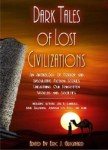
Eric Guignard, ed.
Dark Moon Books, July 2012
Review by Michael R. Collings
When I received the e-file of Eric Guignard’s anthology Dark Tales of Lost Civilizations for Bram Stoker® Award consideration, I had high expectations about reading it. After all, what was not to like? “Dark Tales” — my favorite kind. And “Lost Civilizations” — an interest that, for me, goes back half a century … roughly, it seems, to when several of those civilizations had not yet been lost.
Couple that with an evocative cover listing several of my favorite authors, and I anticipated hours of enjoyable exploration.
Well, my anticipation was not met.
Instead, it was exceeded, by such a degree that I finished the book two days after I received it. Then sat at the table wishing there were more.
The premise behind the anthology is simple enough. Who isn’t intrigued by Atlantis, or the Golden Horde of Ghengis Khan, or mysterious islands in uncharted seas, or the possibility of ancient time-travelers? From those starting points — and a score more — mix in generous quantities of horror, from waking zombies to nameless creatures and animate skeletons, and the result is story after story that captures the imagination and makes the specter of the past even more chilling.
The twenty-five stories, all by fine writers with a careful eye toward craft and artistry, range from the quietly atmospheric to the overtly horrific … ribcages erupting from the living bodies of men. Some incorporate traditional horrors, such as ghosts and Lovecraftian behemoths; others introduce entirely new levels of creatures and creations. In Caw Miller’s “The Small, Black God,” a stone statue becomes the instrument of vengeance and death. In Rob Rosen’s “Buried Treasure,” the treasure found in the northern desert wastes is both that which is sought and something more. Gitte Christensen’s “Whale of a Time” evokes another time and place while simultaneously playing with multiple levels of a manipulated reality. Andrew S. Williams’ “The Talisman of Hatra” subsumes overt horror beneath a challenging story of love and betrayal. Jonathan Vos Post’s “Sumeria to the Stars” transforms the starkness of mathematics into possibilities almost — but not quite — beyond imagining; in its closing lines, it provides a counterpoise to Bruce L. Priddy’s re-creation of ancient epic in “Gilgamesh and the Mountain.”
I could go on, listing almost all of the stories and explaining why each was remarkable, but suffice it to say: If you are at all interested in tales of darkness, in unexplored reaches, in forgotten cities and ding empires, in creatures from the depths of land and sea, even in what might wait at midnight in the tall grass outside a stalled train … this anthology will satisfy your interest, your curiosity, and your desire for a thrill of horror.
Highly recommended.








